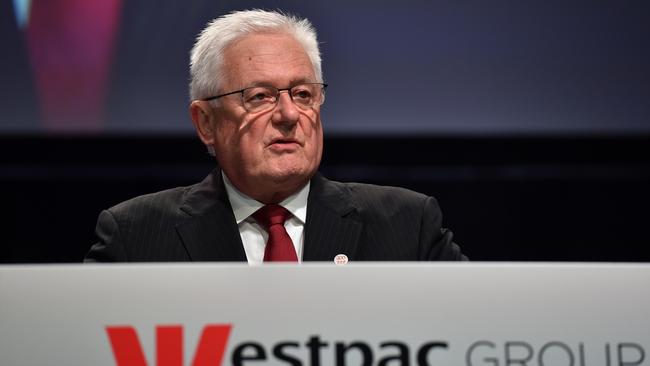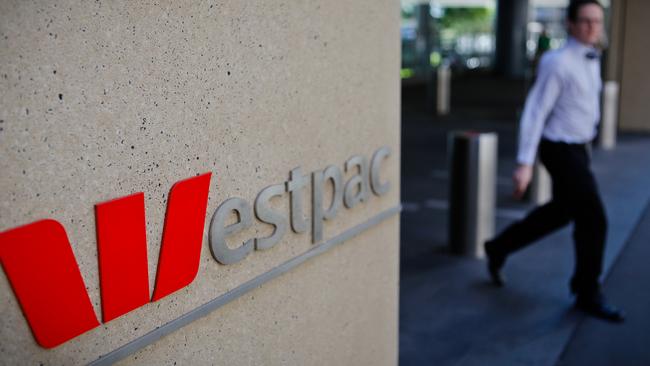Westpac’s surprising new chair pick Steven Gregg shows more to do on bank rebuild
John McFarlane has a trademark capacity to surprise, and this extends to his replacement to oversee the banking major.

Business
Don't miss out on the headlines from Business. Followed categories will be added to My News.
John McFarlane has a trademark capacity to surprise.
The veteran banker has looked outside Westpac’s boardroom to find his replacement through Ampol chair and former investment banker Steven Gregg, who will become the banking major’s next chairman.
The appointment marks Gregg’s return to banking after the past two decades of board roles, including Goodman Fielder, Tabcorp and the gaming company’s spin-off The Lottery Corp.
Gregg was also involved in consulting as a partner with McKinsey.

And McFarlane’s choice to appoint outsider Gregg also shows the rebuild of the nation’s second-biggest bank that he started three years ago is far from over.
Among those that had been in the running for the top job inside the Westpac boardroom include former KPMG national chair Peter Nash and former Commonwealth Bank and NAB chief financial officer and Lendlease chair Michael Ullmer.
However, the 62-year-old Gregg can draw a line that connects several companies he has chaired over the past decade, with each undergoing a major reinvention. Taking the role of chair of troubled food manufacturer Goodman Fielder early last decade, Gregg oversaw a painful restructure that culminated in a $1.3bn sale.

Then at fuel refiner Ampol, where he has chaired since 2017 he oversaw chief executive Matt Halliday’s major repositioning including a $1.4bn New Zealand expansion. Halliday’s Ampol is also positioning itself to play a role in the EV transition that stands to change the fuel refiner’s core business.
Tabcorp too had been reeling from being slow to transition to digital and had rebuffed several low ball buyout offers. There Gregg oversaw the complicated demerger of lotteries and keno business Lottery Corp. Unusually he moved to the new company which has since grown to be four times the size of its former parent.
McFarlane said Gregg has “deep experience chairing consumer-focused companies, a strong track record of disciplined decision-making and contributions to board oversight of organisations undergoing technology transformation”
Westpac rebuild
McFarlane, the former ANZ chief executive and one time Barclay’s chairman, had been coaxed out of retirement at the end of 2019 to oversee the rebuilding of Westpac after it was hit with a massive money laundering scandal that culminated in corporate Australia’s biggest financial penalty. McFarlane appointed the bank’s former chief financial officer Peter King to steer through the job.
The legal action launched by financial crimes regulator Austrac in 2019 also uncovered deeper cultural issues inside Westpac, as well as structural problems of a bloated cost base and only limited progress on merging St George Bank from a mega buyout more than a decade earlier.
Late last year, McFarlane outlined plans to retire at this year’s annual meeting scheduled for December 14. Gregg, who will need to be voted on the board, will then take charge as chairman. Gregg has stepped down from The Lottery Corp.
“From my observation, Westpac is in a period of transition. After the hard work of simplification over the past three years, now is the time to look forward and have a strong ambition,” Gregg said earlier Monday.

Other former roles for Gregg include UK boss of Dutch investment bank ABN Amro and also a period with Wall Street banks Lehman and Chase Manhattan.
But Gregg’s time as partner at McKinsey in the mid-2000s is important. While he wasn’t directly involved in the work at ANZ, the management consultant delivered the Breakout cultural transformation program for the Melbourne-based bank.
This was one of McKinsey’s biggest projects in Australia, extending several years under the firm’s then boss Michael Rennie. With the support of McFarlane McKinsey rebuilt ANZ’s culture and processes and from 2005 ANZ and McKinsey worked on Breakout Recharge to extend the transformation.
It is unusual for a bank to recruit outside the boardroom for the chair position, although with Ampol and Tabcorp, Gregg has experience of chairing large regulated ASX-listed companies.
Bigger rival Commonwealth Bank last year recruited Paul O’Malley from inside the boardroom, although that role marked the former BlueScope boss first chair post.
ANZ too appointed Paul O’Sullivan as chairman after he had joined the board. O’Sullivan has been a longstanding chair of telco Optus.
Great lithium escape
The clear winners so far from the Liontown’s collapsed bid are the short sellers who stand to collect a windfall when the lithium hopeful comes through the other side of its equity raising. Close second is North Carolina-based Albemarle that becomes an accidental winner by walking away from its planned $6.6bn buyout of Liontown.
Indeed Liontown’s chief executive Kent Masters should definitely be sending mining multi-billionaire Gina Rinehart a thank you note. By blocking his overpriced bid, she has given him a face-saving reason to back out of his high priced-lithium deal that also came with buckets of development risk.

Without the support of a $3.00 a share Albermarle bid and Rineheart’s Hancock Resources in a controlling position on the share register with little indication it intends to bid in its own right, Liontown’s bankers UBS now have the very tough sell.
They need to convince investors to back a surprise equity raising launched Monday help fund the financing shortfall for the Kathleen Valley Lithium Project north of Kalgoorlie, where the price tag is now pushing a hefty $1bn.
A combination of weak lithium prices, a string of cost blowouts on Kathleen Valley project, development risk and Rinehart’s own agenda, Liontown’s raising will need to be heavily discounted to get the attention of big shareholders.
Liontown too will have to get around its credibility problem of saying that it didn’t need to return to the market for funding until the next year.
Rinehart’s Hancock with 19.9 per cent certainly has the balance sheet firepower to support a funding shortfall for Kathleen Valley of around $100m. And while Hancock’s intentions are unclear, it has stated it wants to have an influence on Liontown’s future.
Whether that is through introducing another player into Liontown or calling the shots on how the project proceeds it is not yet known. Hancock paid Albermarle premium for its stake on market and will want to see a return.
Before Albemarle opened the bidding for Liontown at the end of March it was trading at around $1.50 a share. That was when the world was more bullish on the medium-term outlook for lithium and the development costs of Liontown’s flagship mine were a fraction of the latest estimate.
Liontown has entered its capital raising in the worst possible position. Its shares were last fetching $2.79 each and no one knows where the market will land. Brokerage Citi has a $2.30 a share price target on Liontown, while Goldman Sachs has set its target at $1.85.
Adding to the pain Liontown’s and other lithium players Pilbara Minerals and Syrah Resources, recently became the nation’s most shorted stocks with each seeing around 10 per cent of their shares held by hedge funds.

For the believers there is still plenty of blue sky for Liontown and Rinehart knows the potential of Kathleen Valley with offtake agreements with Tesla, Ford and LG Chem in place until 2030. And the multi-billionaire’s presence highlights the strategic nature of Kathleen Valley lithium in terms of location and scale.
For lithium believers there is also the longer-term play – based on targeted production Kathleen Valley has a 23-year life. Production is forecast to increase to 700,000 tonnes of spodumene output a year from a very low risk jurisdiction.
At the same time Liontown qualifies for Joe Biden’s all important Inflation Reduction Act funding and this makes the project even more attractive.
Albemarle’s Masters was a backer of Kathleen Valley, but he didn’t bargain for a battle with an Australian mining billionaire. In the end the risks were too great.
johnstone@theaustralian.com.au
Originally published as Westpac’s surprising new chair pick Steven Gregg shows more to do on bank rebuild





